|
This section contains 797 words (approx. 3 pages at 300 words per page) |

|
Probability is the likelihood that a certain event will occur. Unlike classical physics, quantum physics is not completely deterministic. Probability in the context of quantum mechanics has to do with the likelihood of finding a particle, such as an electron, in a particular region around the nucleus at a particular time.
In 1911 Ernest Rutherford developed a picture explaining the structure of the atom in terms of a positively charged nucleus surrounded by negatively charged electrons in orbits. Later, in 1913, Niels Bohr developed a theory that explained why electrons remain in orbits and do not collapse onto the nucleus. Quantum theory, developed during the 1920s, explained many of the phenomena concerning electrons and their role in atoms. In 1924, using Albert Einstein's special theory of relativity, Louis de Broglie showed that all particles with mass, such as electrons, should have wave-like properties, including a...
|
This section contains 797 words (approx. 3 pages at 300 words per page) |

|


